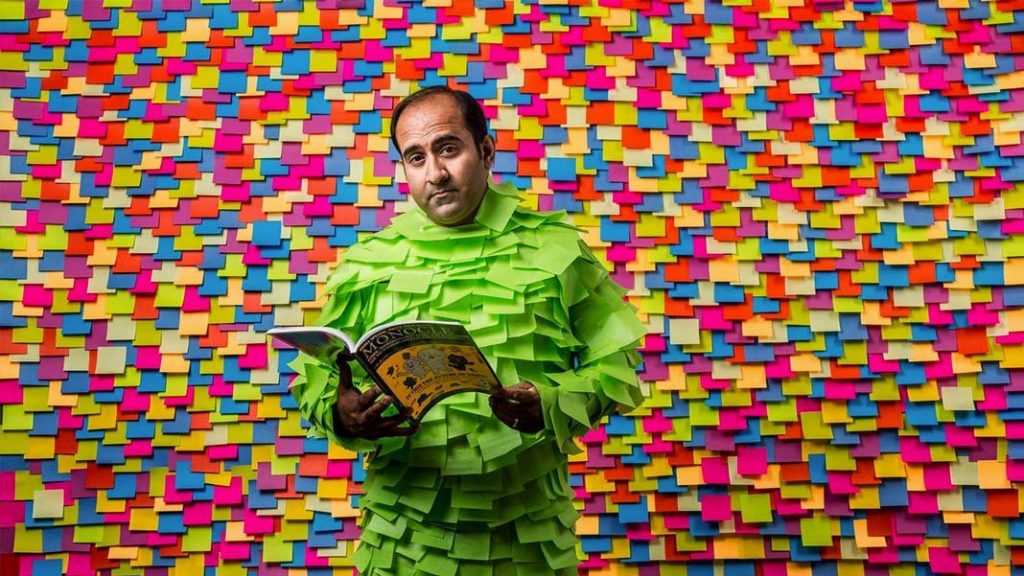When you think of trends that might be shaping the future, the first things that come to mind probably have something to do with technology: Robots taking over jobs. Artificial intelligence advancing and proliferating. 5G making everything faster, connected cities making everything easier, data making everything more targeted.
Technology is undoubtedly changing the way we live, and will continue to do so—probably at an accelerating rate—in the near and far future. But there are other trends impacting the course of our lives and societies, too. They’re less obvious, and while many are tied to technology, some have nothing to do with it.

For the past nine years, entrepreneur and author Rohit Bhargava has read hundreds of articles across all types of publications, tagged and categorized them by topic, funneled frequent topics into broader trends, analyzed those trends, narrowed them down to the most significant ones, and published a book about them as part of his ‘Non-Obvious’ series. He defines a trend as “a unique curated observation of the accelerating present.”
In an encore session at South by Southwest last week (his initial talk couldn’t fit hundreds of people who wanted to attend, so a re-do was scheduled), Bhargava shared details of his creative process, why it’s hard to think non-obviously, the most important trends of this year, and how to make sure they don’t get the best of you.
Thinking Differently
“Non-obvious thinking is seeing the world in a way other people don’t see it,” Bhargava said. “The secret is curating your ideas.” Curation collects ideas and presents them in a meaningful way; museum curators, for example, decide which works of art to include in an exhibit and how to present them.
For his own curation process, Bhargava uses what he calls the haystack method. Rather than searching for a needle in a haystack, he gathers ‘hay’ (ideas and stories) then uses them to locate and define a ‘needle’ (a trend). “If you spend enough time gathering information, you can put the needle into the middle of the haystack,” he said.
A big part of gathering information is looking for it in places you wouldn’t normally think to look. In his case, that means that on top of reading what everyone else reads—the New York Times, the Washington Post, the Economist—he also buys publications like Modern Farmer, Teen Vogue, and Ink magazine. “It’s like stepping into someone else’s world who’s not like me,” he said. “That’s impossible to do online because everything is personalized.”
Three common barriers make non-obvious thinking hard.
The first is unquestioned assumptions, which are facts or habits we think will never change. When James Dyson first invented the bagless vacuum, he wanted to sell the license to it, but no one believed people would want to spend more money up front on a vacuum then not have to buy bags. The success of Dyson’s business today shows how mistaken that assumption—that people wouldn’t adapt to a product that, at the end of the day, was far more sensible—turned out to be. “Making the wrong basic assumptions can doom you,” Bhargava said.
The second barrier to thinking differently is constant disruption. “Everything is changing as industries blend together,” Bhargava said. “The speed of change makes everyone want everything, all the time, and people expect the impossible.” We’ve come to expect every alternative to be presented to us in every moment, but in many cases this doesn’t serve us well; we’re surrounded by noise and have trouble discerning what’s valuable and authentic.
This ties into the third barrier, which Bhargava calls the believability crisis. “Constant sensationalism makes people skeptical about everything,” he said. With the advent of fake news and technology like deepfakes, we’re in a post-truth, post-fact era, and are in a constant battle to discern what’s real from what’s not.
2019 Trends
Bhargava’s efforts to see past these barriers and curate information yielded 15 trends he believes are currently shaping the future. He shared seven of them, along with thoughts on how to stay ahead of the curve.
Retro Trust
We tend to trust things we have a history with. “People like nostalgic experiences,” Bhargava said. With tech moving as fast as it is, old things are quickly getting replaced by shinier, newer, often more complex things. But not everyone’s jumping on board—and some who’ve been on board are choosing to jump off in favor of what worked for them in the past.
“We’re turning back to vinyl records and film cameras, deliberately downgrading to phones that only text and call,” Bhargava said. In a period of too much change too fast, people are craving familiarity and dependability. To capitalize on that sentiment, entrepreneurs should seek out opportunities for collaboration—how can you build a product that’s new, but feels reliable and familiar?
Muddled Masculinity
Women have increasingly taken on more leadership roles, advanced in the workplace, now own more homes than men, and have higher college graduation rates. That’s all great for us ladies—but not so great for men or, perhaps more generally, for the concept of masculinity.
“Female empowerment is causing confusion about what it means to be a man today,” Bhargava said. “Men don’t know what to do—should they say something? Would that make them an asshole? Should they keep quiet? Would that make them an asshole?”
By encouraging the non-conforming, we can help take some weight off the traditional gender roles, and their corresponding divisions and pressures.
Innovation Envy
Innovation has become an over-used word, to the point that it’s thrown onto ideas and actions that aren’t really innovative at all. “We innovate by looking at someone else and doing the same,” Bhargava said. If an employee brings a radical idea to someone in a leadership role, in many companies the leadership will say they need a case study before implementing the radical idea—but if it’s already been done, it’s not innovative. “With most innovation what ends up happening is not spectacular failure, but irrelevance,” Bhargava said.
He suggests that rather than being on the defensive, companies should play offense with innovation, and when it doesn’t work “fail as if no one’s watching” (often, no one will be).
Artificial Influence
Thanks to social media and other technologies, there are a growing number of fabricated things that, despite not being real, influence how we think. “15 percent of all Twitter accounts may be fake, and there are 60 million fake Facebook accounts,” Bhargava said. There are virtual influencers and even virtual performers.
“Don’t hide the artificial ingredients,” Bhargava advised. “Some people are going to pretend it’s all real. We have to be ethical.” The creators of fabrications meant to influence the way people think, or the products they buy, or the decisions they make, should make it crystal-clear that there aren’t living, breathing people behind the avatars.
Enterprise Empathy
Another reaction to the fast pace of change these days—and the fast pace of life, for that matter—is that empathy is regaining value and even becoming a driver of innovation. Companies are searching for ways to give people a sense of reassurance. The Tesco grocery brand in the UK has a “relaxed lane” for those who don’t want to feel rushed as they check out. Starbucks opened a “signing store” in Washington DC, and most of its regular customers have learned some sign language.
“Use empathy as a principle to help yourself stand out,” Bhargava said. Besides being a good business strategy, “made with empathy” will ideally promote, well, more empathy, a quality there’s often a shortage of.
Robot Renaissance
From automating factory jobs to flipping burgers to cleaning our floors, robots have firmly taken their place in our day-to-day lives—and they’re not going away anytime soon. “There are more situations with robots than ever before,” Bhargava said. “They’re exploring underwater. They’re concierges at hotels.”
The robot revolution feels intimidating. But Bhargava suggests embracing robots with more curiosity than concern. While they may replace some tasks we don’t want replaced, they’ll also be hugely helpful in multiple contexts, from elderly care to dangerous manual tasks.
Back-storytelling
Similar to retro trust and enterprise empathy, organizations have started to tell their brand’s story to gain customer loyalty. “Stories give us meaning, and meaning is what we need in order to be able to put the pieces together,” Bhargava said. “Stories give us a way of understanding the world.”
Finding the story behind your business, brand, or even yourself, and sharing it openly, can help you connect with people, be they customers, coworkers, or friends.
Tech’s Ripple Effects
While it may not overtly sound like it, most of the trends Bhargava identified for 2019 are tied to technology, and are in fact a sort of backlash against it. Tech has made us question who to trust, how to innovate, what’s real and what’s fake, how to make the best decisions, and even what it is that makes us human.
By being aware of these trends, sharing them, and having conversations about them, we’ll help shape the way tech continues to be built, and thus the way it impacts us down the road.
This article originally appeared on Singularity Hub, a publication of Singularity University.










